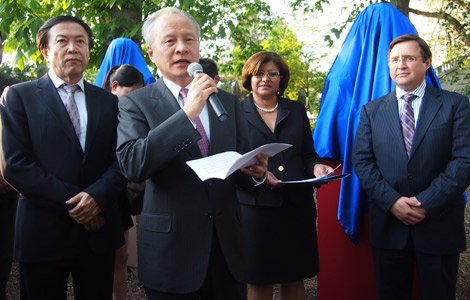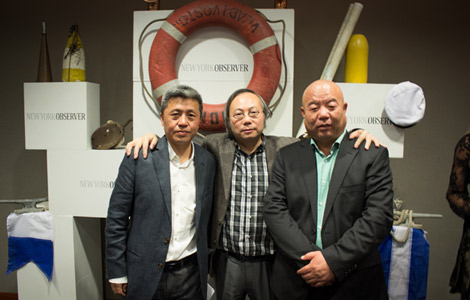US to get more Confucius Institutes
Updated: 2014-05-09 11:47
By Cindy Liu in Los Angeles (China Daily USA)
|
||||||||
 |
|
Xu Lin (center), director general and chief executive of the Confucius Institute Headquarters, and David Coleman (fifth from right), president of US College Board, jointly announced five new Confucius Institutes and 15 new Confucius Classrooms in nine US states on Thursday in Los Angeles. [Cindy Liu / China Daily] |
A total of 20 new Chinese learning centers spread across nine states
Confucius Institute Headquarters (Hanban) and the US College Board announced five new Confucius Institutes and 15 new Confucius Classrooms in nine US states on Thursday.
It marked the first time the College Board establish Confucius Institutes and Confucius Classrooms within its network collaborating with Hanban.
Xu Lin, chief executive and director general of Hanban, said at a ceremony in Los Angeles announcing the new institutes and classrooms that relations between Hanban and the United States are growing stronger as illustrated by the College Board's involvement.
"Chinese is the language of the future," she said. "We are all putting efforts together to hug tomorrow's sun."
The 2014 National Chinese Language Conference also started on Thursday at the Westin Hotel in Los Angeles. This annual conference is the biggest meeting in US for teaching Chinese. Representatives from established and new Confucius Institutes and Confucius Classrooms gathered to share their experiences and insights in running Chinese-language teaching and culture exchange programs.
The College Board, in collaboration with Hanban, launched the 20 institutes and classrooms to support the teaching of Chinese language in grades K-12 and culture education in the US, providing funding, resources and guidance to the participating institutions.
"It is the first year that we take the leadership in running Confucius Institutes and Confucius Classrooms in the US within the College Board's network," David Coleman, president of the College Board, said at the ceremony. "The network is now here!"
Coleman expressed his appreciation to Hanban, especially for Xu's leadership and contributions to the teaching of Chinese language and development of culture exchanges over many years in the US.
"Hanban is just like the sun. It lights the path to develop Chinese teaching in the US. The College Board is the moon. I am so honored to reflect the light that we've gotten from Hanban," said Coleman.
Xu said that Confucius Institutes and Confucius Classrooms in the US are developing in three areas: the influence of Confucius Institutes and Confucius Classrooms is increasing; the quality of Chinese-language teaching is increasing; and innovation and creativity are increasing.
"There so many new ideas to develop Confucius Institutes and classrooms each year. We encourage each school to develop their program based on their own expertise. We absolutely encourage experienced institutes and classrooms to share their ideas with newcomers," she said.
In an interview with China Daily, Coleman highlighted the benefits of promoting Chinese language and culture exchanges for young American students in helping them achieve success in higher education.
"The spirit of hard work that we have learned from Chinese teachers, Chinese students as well as our Chinese partner, Hanban, is so important and precious to every student, not only in the US but in the world," he said.
Coleman said "it is time for young American students to wake up. Hard work is the key for every young person to achieve their academic goals. Actually, the way I look at the impact of working with Hanban is that I see it is as such an amazing self-transforming process - the spirit of hard work changing Americans, not just at school, but also in their daily lives," he said.
Dr. Michelle Cloud, the management representative from the Houston, Texas, Independent School District, which will get one of the new Confucius Institutes, told China Daily in an interview, "We are so motivated to enroll in the US College Board's network. We will receive much more funding from the College Board than before to execute the Confucius Institute."
Qianqian Wang, manager of the Confucius Institute in the Houston Independent School District, told China Daily: "Before we had a few schools that operated Chinese-language classes, and now the whole school district is involved."
Large school districts acting as Confucius Institutes (CIs) will oversee several school-based Confucius Classrooms (CCs), while smaller school districts or independent schools will establish individual, school-based CCs. Each school district and independent school will receive support to build Chinese-language programs leading to AP Chinese.
The first Confucius Institute was established in South Korea in 2004. Today, there are more than 440 Confucius Institutes and 650 Confucius Classrooms in more than 120 countries and regions, teaching Chinese language to more than 850,000 students. The US has the largest network of Confucius Institutes with more than 100.
cindyliu@chinadailyusa.com
Most Viewed
Editor's Picks

|

|

|

|

|

|
Today's Top News
China: Stop harassing oil rig in Xisha Islands
American's lens captures priceless Chinese May 4 history
Court ruling on protester unsettling
Alibaba, ShopRunner to launch joint China service
US museum to return statue to Cambodia
Thai PM faces ban from politics
China tops Global 2000: Forbes
Putin to attend D-Day ceremonies
US Weekly

|

|















